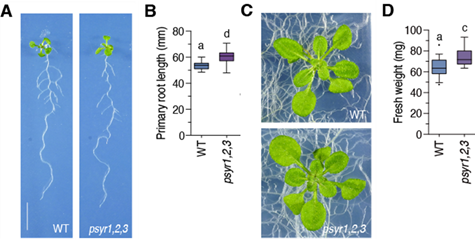Advantage and Core Benefit
- Can breed fast-growing, high-yielding specialty crop varieties for plant factories.
- Safe because it is a knockout of a specific gene by genome editing.
- Low risk of impact on the natural world as they cannot grow in stressful environments
Background and Technology
To respond to environmental stresses such as disease, temperature, drought, and light, plants use a portion of the energy that would normally be used for growth. In other words, there is a trade-off between plant growth and stress response. We identified three types of PSYRs, receptors for the peptide hormone PSY (plant peptide containing sulfated tyrosine) and found that they are involved in switching between growth and stress responses. PSYRs are inactivated when PSY binds (stress response off) and activated when PSY does not bind, inducing the expression of a large group of transcription factors associated with stress responses (cell defense, cell strengthening, etc.). Since PSY is expressed in cells throughout the body, the stress response is normally suppressed, but when cells are stressed and dysfunctional, they are unable to produce PSY and PSYR is activated to induce the stress response.
We found that knockout of PSYR by genome editing enhanced growth compared to the wild type by suppressing the stress response (see Data). PSYR is a conserved receptor from mosses to higher plants and can be applied to tomato and lettuce. Knocking out PSYR will increase yields, but will make the plants more susceptible to stress, and therefore, special varieties can be developed for environmentally controlled plant factories, etc.
Data
- Root growth (A,B) plant body growth (C) fresh weight (D) in PSYR knockout Arabidopsis mutants (psyr1,2,3)
 |
Patent & Publication
Patent pending
Mari Ogawa-Ohnishi et. al. Peptide ligand-mediated trade-off between plant growth and stress response Science. 2022 ;378(6616):175-180. doi: 10.1126/science.abq5735.
Researcher
Dr. Yoshikatsu Matsubayashi (Graduate School of Science, Nagoya University))
Expectations
We would like to develop “plant factory-specific” varieties of lettuce, tomato and other horticultural crops based on the findings of this invention. We would like to create PSYR-deficient strains of each variety by genome editing and verify their growth-promoting effects as well as their taste, nutrients, and appearance, and are seeking partners who can co-develop each variety.
Project No. WL-04302


